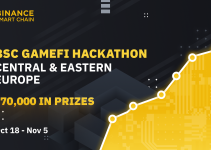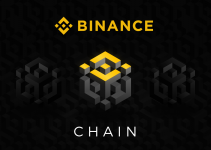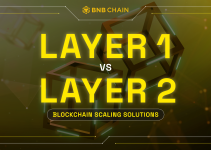
Four months into the launch of Binance Smart Chain (BSC), we share our agenda for 2021, including our vision for BSC and some of the dApp (decentralized app) trends that we will support.
Since its launch in September 2020, BSC quickly captured a large number of users, projects, and transactions. Launched in the height of public interest in yield farming and other DeFi (decentralized finance) activities, BSC was able to capture $1.2 billion in total transactions one month after its launch.
Since then, BSC has gone from strength to strength with the following milestones:
- In mid-December 2020, Trust Wallet issued TWT on BSC and airdropped millions of dollars in tokens to Binance users. BSC daily transactions related to TWT reached as high as 470,000, according to data from BSCScan.com.
- In January 2021, Binance Launchpool launched BTCST, a BSC-based token anchored on Bitcoin computing power. The tradable and liquid token corresponds to 0.1Th/s of computing power and its income. A total of $1.255 billion in deposits, including 10.43 million BNB, 18,600 Bitcoin, and 186 million BUSD, was staked for BTCST.
- As of January 2021, BSC supports 42 cryptocurrencies across the chain to BSC, the total value of cross-chain assets has reached $1.37 billion, and the total market value of Binance BTokens has reached $556 million.
- The projects that use BSC have started to form a closed-cycle ecosystem. This includes infrastructure such as wallets, oracles, insurance, payment, development tools, data tools, NFTs, and trading markets. There are more than 100 projects on BSC, with nearly 60 of those possessing large numbers of users and transaction volume.
- There are 850,975 active addresses on BSC. The blockchain processes 473,000 transactions each day, almost 40% of Ethereum’s numbers. The average gas fee per transaction is as low as $0.07, which is about 2-3% the gas fee of Ethereum.
For more information on BSC’s milestones, read this article.
From Momentum to Direction: A Vision for BSC
When BSC launched, its main objective was to serve as a blockchain that runs parallel to Binance Chain, provides Ethereum compatibility, and unlocks the staking potential of BNB. Given the rapid growth of the BSC ecosystem, the community has set its eyes on a greater vision for the blockchain.
For this year, BSC aims to build cross-chain financial infrastructure that unlocks the Internet of Value.
There are two key phrases we want to explain here:
- “Build cross-chain financial infrastructure” refers to the construction of solutions that will support more interconnections between blockchains. With this, we aim to build more bridges between DeFi and CeFi (centralized finance).
- “Unlock the Internet of Value” refers to the interaction of different dApps and the corresponding transfer of assets across these applications, powered by the bridges that BSC is building.
There has been a growing conversation about Web 3.0, a new paradigm for information sharing that involves a constant connection between the digital and real worlds. Web 3.0 is expected to include blockchain technology, alongside innovations such as augmented and virtual reality, 5G networks, geolocation, Internet-of-Things devices and sensors, and artificial intelligence/machine learning.
Where does BSC fit in this picture? We will make it easier for different blockchains to interconnect and exchange assets quickly. We will also support dApps and their many use cases. The convergence of these elements will form our concept of the Internet of Value. In the same way that smart devices communicate automatically with one another through the Internet of Things, assets and decentralized services are coveted from one person to another in an easy manner through the Internet of Value.
Pillars and Steps: Fulfilling the BSC Vision and Supporting DApps
To achieve this vision, the BSC team aims to find different growth scenarios and work closely with the many projects under the BSC umbrella. Here are the four core missions that encapsulate how we aim to fulfill the BSC vision for this year:
- Strengthen critical infrastructure and services. We want to ensure that the network has top-notch security, that APIs and tools are easy to adopt, that cross-chain transaction, and that CeFi and DeFi are bridged well through Wallet Direct and other solutions.
- Build secure, trust, and holistic DeFi infrastructure. The solutions we build on BSC must satisfy institutional DeFi requirements, so that we can attract more real-world assets and use cases.
- Pursue mass adoption opportunities. Focus on the specific market segments such as gaming, community (fan) tokens, and more.
- Foster strong developer communities. Incubate and accelerate original innovations and high-performing developers.
The BSC team is employing a decentralized approach to the development of the ecosystem, leveraging projects, developers, companies, and other entities that created
“Our position is to match people. That is, we do not develop ourselves, but guide good and suitable projects to do it, and quickly verify the optimal model of growth through resources such as BSC, the acceleration fund, and Binance ecology and community,” a spokesperson from the BSC said.
Specifically, we are looking into multiple dApp categories that we think will matter this year. These are:
1. Algorithms. BSC supports the propagation of digital assets that have algorithmic characteristics
Notable Projects: ditto (elastic supply token on BSC), bdollar (algorithmic stablecoin on BSC)
2. Aggregation and Integration. Solutions that aggregate and integrate multiple yield and exchange sources are important in the maturity of DeFi.
Notable Projects: beefy (yield optimizer), Bearn.fi (cross-chain auto-yield farming), OpenOcean (DEX aggregator), Xend (DeFi for credit unions and cooperatives)
3. Cross-chain and Multichain. As mentioned above, a crucial factor in making digital assets interoperable across multiple networks is the the development of solutions that connect different blockchains
Notable Projects: BTCST (token anchored on Bitcoin computing power, Anyswap (cross-chain exchange), NerveNetwork (cross-chain asset network), PolyNetwork (cross-chain network), renVM (multichain solution)
4. Gamification. The gaming industry is an early use case for blockchain networks like BSC.
Notable Projects: Blink (gaming token), Rocketgame (decentralized gaming platform)
5. Community and Social Tokens. The use of NFTs and specialized tokens via BSC provides a unique solution for online communities and social networks.
Notable Projects: Chilz (fan tokens), Realy (luxury NFT platform)
6. Synthetics. BSC also supports the creation of synthetic assets, or assets that combine various derivative products.
Notable Project: Mettalex (derivatives exchange)
7. Institutional DeFi. BSC provides developers the proper tools to build advanced DeFi services such as liquidity mining.
Notable Project: Allianceblock (decentralized capital market)
8. Infrastructure and Tools. At the core of building various applications on BSC are the solutions that help developers in deploying smart contracts, monitor data, and more.
Notable Projects: Bitquery (blockchain data), PARSIQ (cross-chain monitoring), Tenderly (smart contract monitoring), BSCscan (blockchain explorer), ChainIDE (smart contract deployment), Mywish (smart contract creation), Nownodes (blockchain infrastructure)
The BSC team has already explored many private chains and alliance chains with poor liquidity of physical assets, and discovered a large number of high-quality assets suitable for opening to more users. “There are also other real-world applications for BSC such as stocks and real estate, and you will soon be able to see it on our chain.” the BSC team noted.
For the latest news please join BSC Discord.
Build on Binance Smart Chain. Join Us Here.


